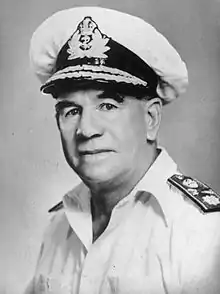Arthur Rullion Rattray
Rear Admiral Sir Arthur Rullion Rattray KBE, CB, CIE (2 May 1891 – 10 August 1966) was a British naval officer who served in the Royal Indian Marine, and also on attachment to the Royal Naval Flying Service / Royal Flying Corps. [1] He later rose to senior rank in the Royal Indian Navy during World War II.
Arthur Rullion Rattray | |
|---|---|
 Rear Admiral Rattray, c.1945 | |
| Born | 2 May 1891 Gatehouse of Fleet, Kirkcudbrightshire, Scotland |
| Died | 10 August 1966 (aged 75) Camberley, Surrey, England |
| Allegiance | United Kingdom |
| Service/ | Royal Indian Navy British Army Royal Air Force |
| Years of service | 1912–1946 |
| Rank | Rear Admiral |
| Unit | No. 104 Squadron RAF |
| Battles/wars | World War I • Mesopotamian Campaign • Western Front World War II |
| Awards | Order of the British Empire Order of the Bath Order of the Indian Empire |
Biography
Rattray was born in Gatehouse of Fleet, Scotland, the fourth of five children born to Arthur Rattray, a retired Indian Civil Servant and judge, and his wife Mary Louise Wakely (née Sutherland). His parents had returned from Bengal, where their first three children were born, in around 1889.[2]
Rattray was sent to HMS Conway, a training ship based at Liverpool, in January 1906, remaining there until December 1907.[3] He then trained at HMS Ganges, near Ipswich,[2] before serving in the Merchant Service, working for the Aberdeen-based shipping company of George Milne & Co.,[4] until joining the Royal Indian Marine in 1912.[5]
Rattray continued to serve in the RIM after the outbreak of World War I, but on 15 February 1917 he was appointed a temporary lieutenant on the General List ROYAL NAVAL AIR SERVICE att. ROYAL FLYING CORPS / rfc][6] as a flying officer (observer), with seniority from 7 November 1916,[7] but without prior pay or allowances.[8] Transfer to RFC from RNAS 6th November 1916 becoming a member of the RNAS attached to RFC 30 Squadron No. 30 - BE2c. Mesopotamia / reconnaissance. Gained a mention in despatches from the Commander-in-Chief, Lieutenant-General Sir Stanley Maude, on 15 August 1917.[9] Mesopotamia / reconnaissance. Piloted by Lt Page in BE 2c serial 4582 low level bombing attack, shot up by ground fire. Rattray wounded in the leg. 3 weeks in hospital. (sick leave from 29/11/17 : I year 85 days service with RFC). Service records stating his transfer back to the Royal Navy (minesweeping duties, Ramsgate), in January 1918. Transferred back to Royal Indian Marine : 17/11/20 after sixteen months Leave. Rattray rejoined the Royal Indian Marine, which became the Royal Indian Navy in 1934.
On 26 December 1934 he was promoted from lieutenant commander to commander,[10] and to captain on 5 April 1940.[11] By the time he was made a Companion of the Order of the Indian Empire on 1 January 1943, he was serving as a commodore,[12] and by 14 June 1945, when he was made a Companion of the Order of the Bath, had been promoted to rear-admiral.[13] By the time he was made a Companion of the Order of the Indian Empire on 1 January 1943, he was serving as a commodore,[12] and by 14 June 1945, when he was made a Companion of the Order of the Bath, had been promoted to rear-admiral.[13] He was serving as Flag Officer, Bombay, during the 1946 mutiny. Rattray was made a Knight Commander of the Order of the British Empire on 1 January 1948,[14] two weeks before his retirement on 13 January. Rattray was made a Knight Commander of the Order of the British Empire on 1 January 1948,[14] two weeks before his retirement on 13 January.[15]
Rattray died at his home in Camberley, Surrey, on 10 August 1966.[16]
References
- "Arthur Rullion Rattray". The Aerodrome. 2015. Retrieved 11 November 2015.
- "The Rattrays of Roseville". Gatehouse Folk. 2015. Retrieved 11 November 2015.
- "Conway Cadets List ("R")". hmsconway.org. 2015. Retrieved 11 November 2015.
- "Gatehouse of Fleet Connections with World War One: Arthur Rullion Rattray". Gatehouse Folk. 2015. Retrieved 11 November 2015.
- "The Royal Indian Marine 1900-1920" (PDF). jhfk.com. 2014. Retrieved 11 November 2015.
- "No. 29967". The London Gazette. 2 March 1917. p. 2128.
- "No. 30051". The London Gazette (Supplement). 4 May 1917. p. 4314.
- "No. 30058". The London Gazette (Supplement). 8 May 1917. p. 4448.
- "No. 30233". The London Gazette (Supplement). 14 August 1917. pp. 8327–8329.
- "No. 34196". The London Gazette. 6 September 1935. p. 5660.
- "No. 35176". The London Gazette. 30 May 1941. p. 3113.
- "No. 35841". The London Gazette. 29 December 1942. p. 6.
- "No. 37119". The London Gazette (Supplement). 8 June 1945. p. 2935.
- "No. 38161". The London Gazette (Supplement). 30 December 1947. p. 10.
- "No. 38262". The London Gazette. 16 April 1948. p. 2413.
- "No. 44091". The London Gazette. 23 August 1966. p. 9338.